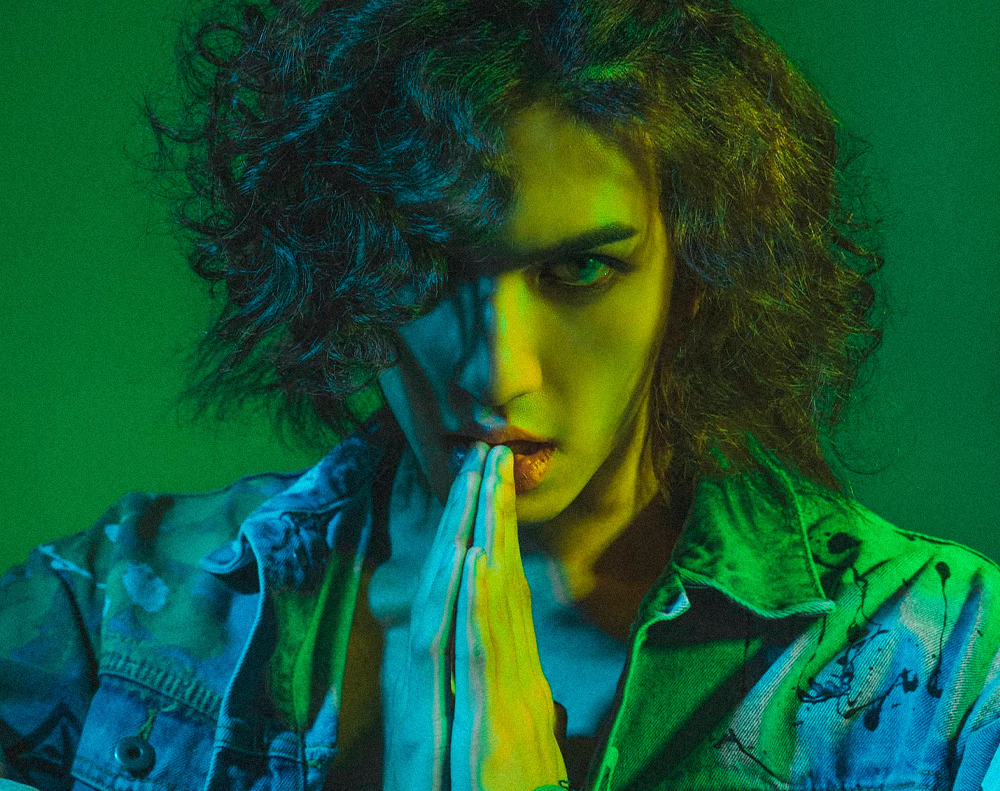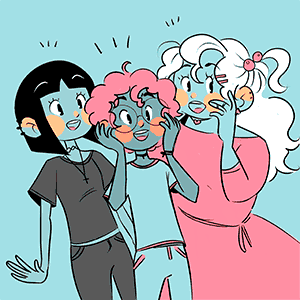We had the opportunity to chat with Victor Han, the first brazilian who had the opportunity to debut in a k-pop group, About U, in South Korea. Victor was kicked out a few weeks after his debut for breaking a drumstick on a music show, but that was not the end of his career as he works as YouTuber and has been conquering South Korean television shows.
In an interview with K4US, Victor detailed his time as a trainee and some problems suffered such as moral harassment and racial discrimination, told a little about his relationship with his father, with whom he was away for 12 years and revealed one of his greatest longings in Brazil: the hug! You can check the full interview below.
Interview
Hello, Victor. Before we begin, we would like to thank you for the opportunity to interview you. The interest in producing this material has been going on for a long time, but only now do we feel that we had the necessary openness to do so. For starters, you have received a lot of love and support from Brazilians, as your story went viral on social networks and especially on YouTube. How is receiving all this support?
Brazil is my birthplace, the place where I was born. It is stronger than me, it is the blood that runs through my veins. I worried about being exactly on the opposite side of the globe, and also for having an Asian / mixed race appearance, I didn’t know if I would be discriminated against, but I must confess that I was surprised when I received so much support and affection from the Brazilians.
Now talking a little bit about what happened to you. You trained for eight years to finally make your debut, but only three weeks later you were kicked out of the group for a very unusual reason. How was it for you to deal with this situation? Did you ever think about giving up your music career?
I had zero intentions to give up on music. Whatever I do in the future; another type of job or even a new career, I will never be able to give up music. That was a devastating time in my life, but I tried to stay positive. That was the moment of truth where I discovered the beginning of my freedom
The birth of K-Pop is widely attributed to the group Seo Taiji & Boys who, in their debut, were severely criticized by the industry for having a “rebellious” posture. However, their work became popular with young people and, later, the group became a reference in music. Do you believe that, just like in this trajectory of the trio, the South Korean audience can still get used to a more radical attitude of the artists, like the one you demonstrated in your performance?
Come to think of it, it sounds quite similar. Regardless of what my previous company or some broadcasting stations have thought, I had full support from my fans by starting a direct contact with them on YouTube and that led to my re-entering broadcasting stations with my own strength and influence. Okay, broadcasters have enormous power, even over artists, but above that is the great mass. It is them who approves or disapproves the content.
Still on this episode, we know that breaking drumsticks and instruments are extremely common behaviors in the rock scene. Do you believe that these more “rebellious” expressions can alienate the genre from popular media? Are there any South Korean bands that you like and would like to present to the public?
There are amazing rock bands here in Korea. Many of them made their way into live TV shows, while some forced random rebellious behavior simply to get the audience’s attention. Thus, broadcasters protect themselves by scripting everything you will be doing during the program. With that, what happened to me was inevitable. They judged me to be inappropriate at first. K-pop is not just about idols, as you well know. Rock bands like YB and Guckkasten are doing really well even on TVs. I have a lot of influence from them in my work.
Despite what has happened, you have participated a lot in TV and radio programs. Were you surprised in any way with this fame? After leaving the group, was it a goal to achieve fame on your own as a strategy, or did it all happen naturally without planning?
I think I was very lucky. It was as if all my stars were aligned. I was brainwashed to believe that I would only succeed if I were a good boy following the instructions of previous companies. So I had to endure horrible things like bullying and racial discrimination. Considering what really happened, which was breaking a stick and becoming popular overnight, you can see it as a plan or strategy, but it wasn’t planned. For me this success was quite unexpected. It is almost as if the chains that held me had been broken along with my drumsticks on March 8.
In one of your videos, you claimed that you do not intend to sign with any company. Does this decision have anything to do with your experience in the entertainment industry, or was it influenced by other factors that we do not yet know?
Because of my experience in Korean Showbiz, I said that, in a way, TV stations feel above the artists and also believe that they are above the general public. The leaders who have run the Korean entertainment industry for more than 30 years tend to believe they know what people want. But the truth is that the masses choose what they want to see. Does TV influence content? Yes, but in the end the ones who decide what they want to watch are those who are at home sitting on the couch in front of the TV. If a company respects me as a real human being, not as a doll or merchandise, of course I will consider any suggestions. Unfortunately, most trainees are judged solely on their market and product value. So I feel better working as a team with my friends, who respect me.
Because you like drums, we can assume that you have a musical root that was born out of rock, right? We have already seen in some videos of you saying that you like Led Zeppelin a lot, including. Tell us a little bit about which rock bands are part of your playlist.
Of course I love rock, it is my biggest influence. You’re right, I love Led Zeppelin, Queen and I’ve spent a good part of my life listening to Green Day, Blink 183, Nirvana, and many other bands outside the circuit that I think you may not even know. I can say that I have a very eclectic taste for music. I also enjoy the funky groove of “Two Ton”, but today, basically, I listen to more K-pop.
Talking about a current career, in August, you released “Am I”, a song with very strong lyrics about feeling lost and strange. Where did the inspiration for this song come from? Anyway, do you intend to release a video clip for her?
Actually, “Am I” is not my own, but I found the lyrics so touching and dialogues so much with the moment I live today. Then I asked my friend if I could release this song on my album and he allowed it. And of course, I intend to make an MV of that song!
Still about your videos, you said that you never intended to become a k-pop artist, but rather a professional drummer. However, he ended up debuting in the band About U, which was aimed at the kpop consumer. Weren’t your eight years as a trainee really meant to become a k-idol? Explain this training period better. Today do you see yourself as an idol or do you think you would fit into another denomination?
I joined that company to be a professional drummer, I didn’t think I could be an idol. They always told me that I was ugly and that I was past my age, that the Korean market would not accept me and that it was best for me to be “just a drummer in a professional band”. Of course hearing it hurts, right? But I was not concerned with fame or anything like that. I really wanted to do music, so I spent 8 years as a trainee studying on my own within the company. Eventually, other young and “handsome” guys joined the company and so I became the drummer for the band About U. If I had to define myself today, I would say that I am a youtuber, not just a youtuber who plays and talks about drums. The content on my channel is very diverse and I like that. Being able to express myself freely and without “labels” is priceless! On the other hand, I am trying to conquer my space as a singer in the k-pop scene and, with your support, I hope I can be playing on live TV programs again.
There are very few mestizos in South Korea being successful, and some have already claimed difficulties either to live in society or even in the entertainment industry. In one of his videos, he said that it is normal for you, but that in the world of music the situation is different. Could you comment more about?
What I meant is that the entertainment industry needs to create content to suit the taste of the masses and they believe that Latinos would still not be well accepted in Korea. Naturally, companies do not want to take risks and that is why they do not put Latinos at the forefront.
When we heard about your debut, we automatically remember your participation in the program “Arrivals and Departures” on the GNT channel, where you tell an exciting story about you and your father. We don’t know if kpoppers in Brazil know about this participation, but we realized that after their debut the episode went off the air on digital platforms. Can you tell us, even if briefly, as a bit of your life story?
I couldn’t see my father for 12 years, 10 years of which I couldn’t even speak to him. As you saw on the TV show, I found my dad on Facebook and we started talking to each other via messages. Two years later we met again here in Seoul. I always had an unexplainable attraction to music that intensified each day, so I was shocked when I found out that my dad was making music professionally. As I get older, I find my father in the mirror and many things start to make sense. It is the power of genes. DNA speaks louder. I can’t see it often, but we are constantly in touch to fill the gap in these 12 years and develop a parent-child relationship that we were unable to experience.
Now let’s talk about Brazil once again. Your father lives here and you sometimes visit the country sometimes. What do you like most about Brazil that you would like to have in South Korea? Be it any cultural aspect, like music, gastronomy or even way of living.
Brazilian hug!!! I love the culture of the Brazilian embrace, that way of expressing the joy of meeting someone. I also love Brazilian food, I love Churrasco (barbecue), Feijão(beans) especially Brigadeiro! Desserts are plentiful here in Korea, but I’m really crazy about a brigadeiro. But if they become popular here in Korea, I will certainly put on weight. The brigadeiro brings me memories of my early childhood in Brazil, maybe that’s why it has a special meaning.
Interview by K4US | Edited by Jolu | Review by Fran
Please, do not use without giving the credits: www.k4us.com.br
 Português
Português English
English 한국어
한국어
